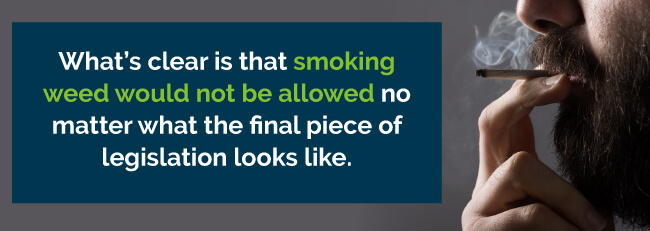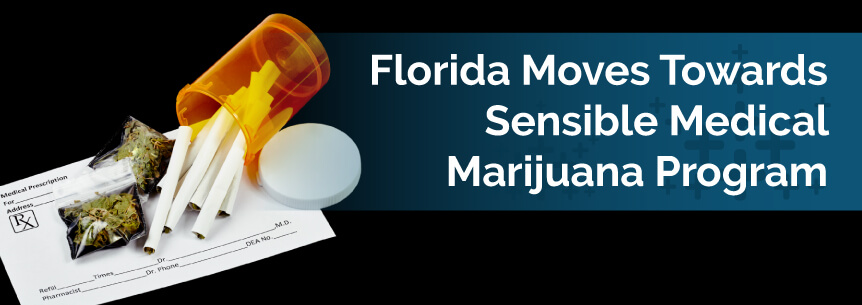There has been some potentially encouraging movement toward a somewhat legitimate medical marijuana program in the state of Florida. But, as is the case nearly everywhere else in the country, narrow-minded legislators are threatening to scuttle the entire process.
A Tale of Two Versions: The Senate
The Florida Senate received SB 406, sponsored by a Republican. Senator Rob Bradley’s bill promotes a logical way for Florida to finally make medical weed available to a large number of people who are suffering from a variety of very serious illnesses. Voters in the state approved expansion of the medical marijuana in November 2016, but they were still waiting to see the benefits nearly seven months later. The reason is because some legislators were trying to figure out how to best regulate the program, while others were working to undermine the will of the people.
The Senate’s version finally reached the floor on April 25 after being passed by the Senate Appropriations Committee. However, a final vote had not been held as of this writing.
Bradley’s bill is seen as far less restrictive than another medical pot bill being considered by the House. Bradley’s version, for example, would call for the following:
- Expanding the number of marijuana dispensaries allowed in the state as the number of medical pot users hit certain benchmarks. The number of dispensaries would expand by five when the program has 250,000 patients, another five when the program hits 350,000 patients, then five more at 400,000 patients. Once the number hits 500,000 patients, the number would again expand by five for every 100,000 additional program participants. The law currently allows only seven dispensaries.
- SB 406 would eliminate the 90-day waiting period for new medical marijuana patients. Participants in the program could increase their supply of cannabis from 45 days to 90 or larger if they receive approval from their doctor.
- The proposed bill would also create a medical marijuana research program at one of Florida’s leading research facilities.
- Visitors to Florida would be able to receive medical weed as long as they are authorized to do so in their home states.
A Tale of Two Versions: The House
While Bradley’s version offers a common-sense approach to regulating an expanded medical marijuana program, the House version is drastically different. This more restrictive proposal has the backing of anti-drug groups as well as several staunch conservatives in the House. That says all you need to know about how it would affect patients who deserve the benefits of therapeutic cannabis.
For starters, the House version would keep the 90-day waiting period intact. It would also outlaw other forms of using medical weed, such as edibles or vaping. The House bill would also prohibit pregnant women from using weed — even if their doctors suggest it.
There is at least a chance that the House version could eventually allow vaping and edibles, if negotiations allow. What’s clear is that smoking weed — through either a joint, a bong or through any other means — would not be allowed no matter what the final piece of legislation looks like.

One of the more troubling aspects of the House version is that, as of this writing, there was no provision for expanding the number of dispensaries, as would be allowed by the Senate version. If this is not rectified, patients who need medical cannabis will more than likely eventually face extremely long wait times in order to obtain their medicine. In addition, if competition is not encouraged, cannabis will very likely be too expensive for many patients. According to U.S. News and World Report, a woman who was addressing a House committee said that medical cannabis costs $3,000 a month in Florida, compared to only $500 in Colorado.
Behind Closed Doors
It was very unclear how legislators would eventually work to come up with a modified bill that could pass both the House and the Senate. According to The Bradenton Herald, the final plan will be hashed out behind closed doors, without giving the public the ability to comment on whatever compromise is reached. There were only three public hearings regarding the legislation, and comments, the newspaper reported, were usually limited.
What It Means for Florida Medical Marijuana Patients
Again, the Senate version, while not perfect by any means, is clearly the far superior version when it comes to serving the interests of seriously ill people who need the therapeutic benefits of medicinal cannabis. Critics of expanding the medical weed program in Florida seem to be focused more on closing the door to potential abuse than opening the program to help those who need it most.
They are also opposed to adding chronic pain to the list of approved conditions. Current legislation would only allow people suffering from the following conditions to be able to access medical pot:
- ALS
- Cancer
- Chronic muscle spasms
- Crohn’s disease
- Epilepsy
- Glaucoma
- HIV/AIDS
- Multiple sclerosis
- Parkinson’s disease
- Post-traumatic stress disorder
- Terminal illnesses
No matter what the ultimate bill finally looks like, it’s apparent that it will not meet the wishes of those who voted for an expanded medical weed program in November 2016. For example, voters wanted to expand access to those whose doctors determined they could benefit from medical marijuana — this would bring access to far more people than those who suffer from the relatively limited list of illnesses above.
Legislators would also change the will of the voters in regard to how doctors could recommend marijuana for their patients. Instead of allowing doctors to make recommendations at their discretion for conditions such as anxiety or debilitating pain, the Florida Board of Medicine would make that decision for an individual patient, not that person’s own doctor.
While there appears to be no “perfect” answer in terms of the different versions of the medical cannabis bill, the Senate version comes closer to establishing a common-sense marijuana program than that proposed by the House. MarijuanaDoctors.com will continue to keep you updated regarding this critically important development regarding the rights of medical marijuana patients in Florida.






